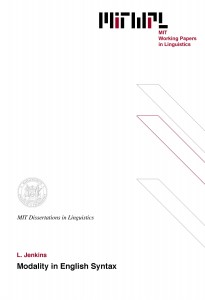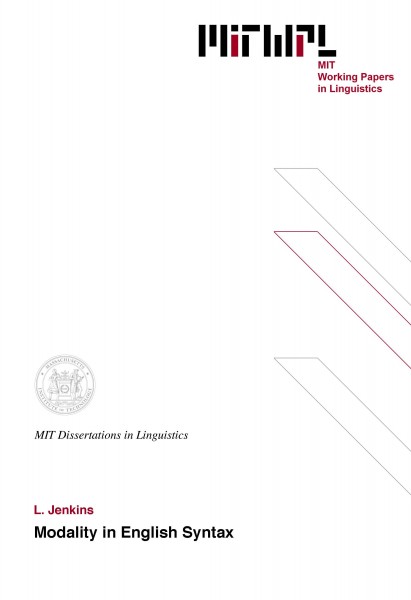Modality in English Syntax
L. Jenkins, 1972
This study of the English modal system centers around three problems for English and general syntactic theory: 1. Conditions on the form of grammar – surface structure interpretation. 2. Interpretation of modality in complement constructions; e.g., as in John expects to know the answer tomorrow (future: John will know the answer tomorrow). 3. Conditions on the functioning of grammars – the control problem and the By Phrase Constraint.
Evidence is first given for the postulation fo a syntactic category M(odal).
Next it is shown that rules of interpretation on surface structures are needed to account for the correct semantic interpretation of a number of constructions involving modals.
We then demonstrate that for a variety of constructions in English such as John expects to know the answer tomorrow, syntactic considerations show that a rule of future interpretation (will-interpretation) rather than a transformational rule of deletion (will-deletion) is required.
Finally it is argued that modals play an essential role in the statement of the “control problem”.
Thesis Supervisor: Noam Chomsky
Title: Professor of Linguistics
Table of Contents
Introduction 7
Chapter One The Modal as a Syntactic Category
Part A A syntactic analysis 23
Part B A semantic analysis 24
Part C Alternative analyses of the English M(odal) 29
Footnotes 30
Chapter Two Modals and Surface Structure Interpretation
Part A Introduction 35
Part B Surface structure interpretation 37
Part C Surface structure interpretation with modals 43
Part D The modal as main verb proposal 49
Part E Modals as transitive/intransitive verbs 52
Part F Modals as main verbs 65
Part G Root vs. epistemic modals 72
Part H Modals and cognate verbs 75
Part I The modal as semi-modal 81
Part J Other auxiliaries as main verbs 97
Footnotes 139
Chapter Three (Implicit) Modality in English Complement Constructions
Part A Introduction 165
Part B Will-interpretation vs. will-deletion 169
I. Declaratives 169
II. If-clauses 172
a. The future time adverbial argument 174
b. The two wills argument 176
c. The idioms argument 178
III. That-complements 180
IV. To-infinitives 181
Footnotes 186
Chapter Four Modals and Language Universals
The Control Problem and the By Phrase Constraint
Part A Introduction 192
Part B The control problem 192
Part C Modal constraints in the control problem 194
Part D Semantics and the control problem 196
Part E The by phrase constraint 199
Footnotes 206

